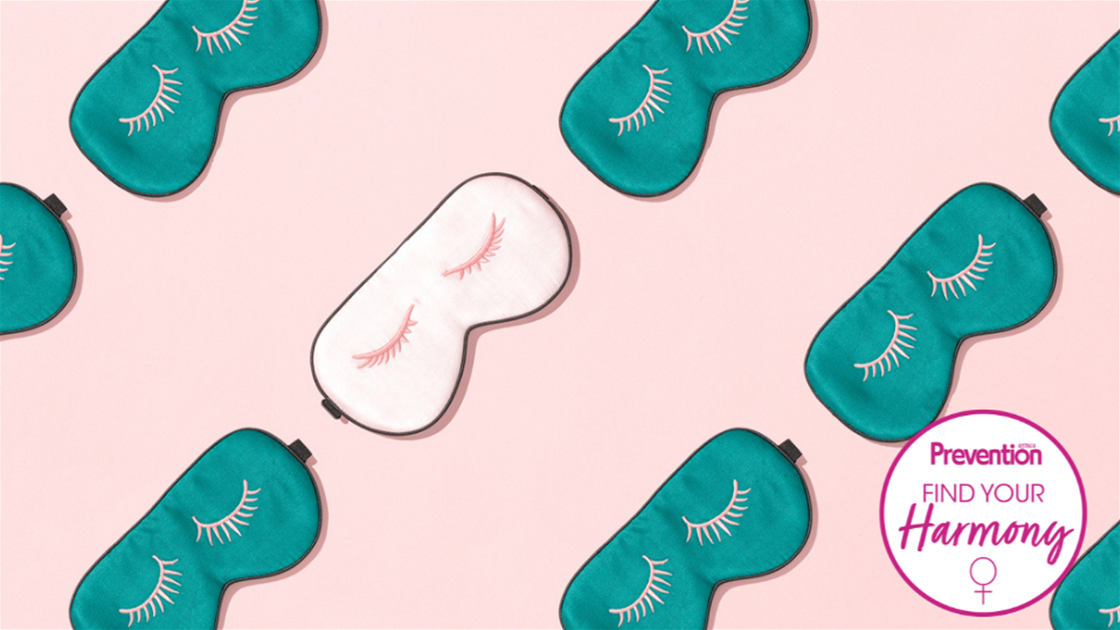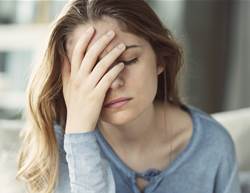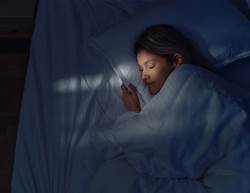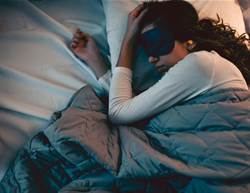Whilst we sleep, our brains do a little housekeeping and sweep out waste that builds up during the day, which may explain why when we are sleep deprived, we don’t function at our best. We may become cranky, forgetful, foggy and clumsy as a result of not getting the right amount of z’s.
Women in particularly struggle to get enough restful sleep, with most of us receiving below the recommended 7-9 hours. And as we get older, we also experience a natural decline in our deep-sleep from 30 onwards. By 50, most women receive around 50% of the amount of sleep we did in our teens. However this natural decline is not the only factor that causes sleepless nights, in fact there’s many other reasons that might be meddling with our sleep, here’s four of the most common – and what you can do about them.
Sleep meddler #1: Your mobile phone
Electronic devices like phones or laptops can become addictions we aren’t able to switch off at night, plus the short wavelength (blue) light blocks melatonin, your body’s sleep-inducing hormone. Reading on a tablet may also be a culprit as studies have found users of e-books felt less sleepy at night and took more time to fall asleep than those reading printed books. They also felt more tired the next day despite having eight hours' rest.
Sleep Solution:
Put your devices away at least an hour before bedtime. Just two hours of blue light has been shown to decrease melatonin production by 23%, so powering down your devices will help maintain melotonin for a good night sleep. Try instead to set up a soothing bedtime routine. You might take a hot shower or bath before bed – the temperature change helps your body prepare for sleep; pick up a book or magazine, or even try listening to an audiobook, just make sure your device is well out of sight.
Sleep meddler #2: the M-word
Menopause can disrupt sleep as the production of oestrogen and progesterone decreases and eventually stops, which can affect women’s appetites, libido, mood and sleep – to name a few.
As oestrogen levels drop, our sleep-wake cycles can be disrupted. Oestrogen is also a natural antidepressant, so dropping levels can make for poor mood, as well as higher body temperatures (leading to night sweats) and disordered sleep.
Sleep solution:
If you experience night sweats, try switching to a mattress with cooling technology, or opt for a cooling blanket to manage your temperature whilst you sleep. Changing the temperature of your bedroom may also help - a temperature of no more than 20 degrees is recommended for a harmonious night’s sleep. And be sure to talk to your doctor about options to manage your other menopause symptoms.
Sleep meddler #3: Stress
Insomnia for many may be linked to stress, caused by daily pressures such as balancing work, family, and relationships - though it can be difficult when experiencing anxiety to know what exactly is keeping you awake. Stress stimulates our adrenaline, an adaptation that helped us manage threats like bears and tigers in the stone age by activating our fight or flight mode, but today makes for sleepless nights when we can’t switch it off as we think about future stressful situations.
Sleep solution:
Practicing a simple relaxation meditation before going to sleep can help ease anxiety and put us in a more restful state to invite sleep. Just 10 minutes before you fall asleep can do wonders for your sleep as studies have shown people that practice meditation before bedtime have better quality sleep. Try this simple routine to create some bedroom harmony:
1. Lay comfortably in your bed, on your back
2. Breathe slowly in for 4 seconds, hold your breath for 4 seconds, and breathe out for four seconds
3. Repeat 10 times, paying attention to breathing slowly in and out through your nose
Sleep meddler #4: Your medications
If you are taking medication, you might be surprised to hear that some common medications can have irritating effect on sleep. Anti-depressants, steroids, blood pressure medications and even some cold and flu medicines may cause insomnia, night sweats and racing thoughts that can keep us awake.
Sleep solution: Talk to your doctor about your medication to determine if it might be the culprit. Not all drugs in these classes cause problems, so it’s wise to rule out other factors before switching or stopping altogether. Some health conditions like high blood pressure may even be managed without medication, but your doctor is best placed to advise you before you make any changes.









